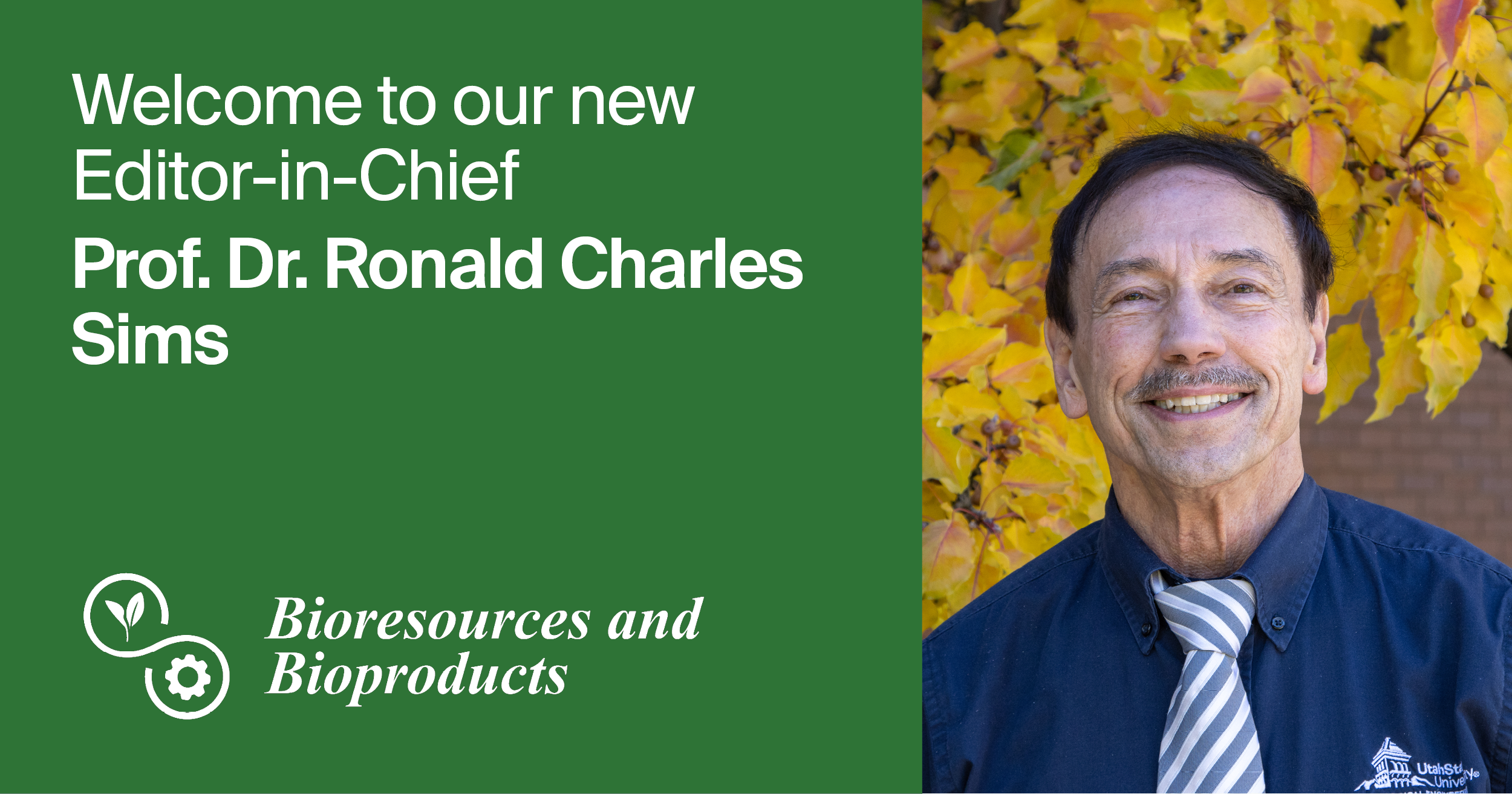
Prof. Dr. Ronald Charles Sims Appointed Editor-in-Chief of Bioresources and Bioproducts
Prof. Dr. Ronald C. Sims (webpage: https://engineering.usu.edu/be/people/faculty/sims-ronald) is a faculty member at Utah State University in the Department of Biological Engineering (BE). He currently serves as the Huntsman Corporation Endowed Professor and Co-Director of the Sustainable Waste to Bioproducts Engineering Center (SWBEC). Prof. Dr. Sims was the founding head of the BE department. With a BS in biology, University of Dayton, Ohio; MS degrees in global public health from the University of North Carolina at Chapel Hill and environmental engineering from Washington State University; and a PhD degree in biological and agricultural engineering from North Carolina State University, he embraces a multidisciplinary and interdisciplinary view of the world. Prof. Dr. Sims was able to gain experience in applying this education working as Supervisor of the Environmental Control Laboratory for Mobay Chemical Company, subsidiary of Bayer AG, as Director of the International Program in Environmental Aspects of Industrial Development for the United Nations Industrial Development Organization (UNIDO) and the U.S. State Department's Agency for International Development (AID), as a process engineer with Research Triangle Institute (North Carolina), as an environmental engineer with the U.S. Environmental Protection Agency (U.S. EPA), and as Director of the State of Utah Water Research Laboratory. Prof. Dr. Sims is an enthusiastic advocate of global industry–academic–government collaborations.
His research focuses on biological engineering related to public health and the environment, bioprocess engineering, wastes to bioproducts, sustainable energy engineering, microalgae biofilm theory and applications, wastewater treatment, and the bioremediation of toxic and hazardous residues. Prof. Dr. Sims teaches undergraduate and graduate courses in biochemical engineering, thermodynamics, upstream and downstream processing, transport phenomena, toxic and hazardous waste treatment, and physico-chemical water treatment processes.
The following is a short interview with Prof. Dr. Ronald C. Sims:
1. What motivated you to take on the role of Editor-in-Chief for this journal?
This journal addresses a more comprehensive and more inclusive vision of global sustainability and the bioeconomy with the support of a highly prestigious editorial board. I was motivated by the opportunity to build on this vision and the potential to help develop a proactive community dedicated to high-quality research focused on creating new bioproducts to ensure economic growth while improving public health and the environment. I was also interested in a journal dedicated to interdisciplinary and multidisciplinary areas that are integrated and focused on improving global sustainability.
2. What is your vision for the journal’s future?
My vision for Bioresources and Bioproducts is to help position the journal as the global leader in setting a research and application agenda that is more comprehensive regarding waste to value and wise resource utilization for improving global stewardship. I would like to help the journal serve as a network for industry–academic–government research and industry scale-up applications. Also, bridging fundamental research with full-scale implementation would be a logical function of the journal, including upcycling, sustainability, and biomanufacturing. Furthermore, Bioresources and Bioproducts can contribute by promoting multidisciplinary dialog and implementation.
3. What are the key future directions you see for this field of research?
Bioproducts from bioresources are moving towards a future where sustainability, upcycling, bioenergy, and multidisciplinary integration will be the driving forces of innovation. Biological design, construction, monitoring, and performance from the genetic level to the parts, components, devices, and systems scales will be integrated with non-biological components and systems to create new functional materials to enable cleaner and more sustainable processes that contribute to a sustainable bioeconomy. Modeling and artificial intelligence are also becoming indispensable, accelerating the design of biocatalysts and bioprocesses and making scale-up from the laboratory to industry applications more reliable and cost-effective. The future of the field lies in strengthening its multidisciplinary character to address global challenges such as environmental quality, global public health, climate change, and a sustainable bioeconomy.
4. What are your perspectives on the development of open access publishing?
Open access publishing has taken the lead over the past decade. While there was some skepticism regarding its survivability and quality standards, currently the evidence is that open access has become a critical contributor to the dissemination of scientific knowledge. Access to the latest scientific advances by the research community, industry, government organizations, and the general public has become more immediate. Broader accessibility fosters collaboration and accelerates innovation. For open access to be effective and trusted, publishers must guarantee robust peer review processes, strong editorial standards, and transparent publication practices. Researchers and institutions are increasingly attentive to these elements, which is helping to build trust and strengthen the credibility of the open access model. The strategy forward is to continue to improve its dissemination, credibility, affordability, and inclusivity so that it serves the entire scientific, engineering, and public community, while ensuring that the highest standards of quality and integrity are maintained.
We welcome Prof. Dr. Ronald C. Sims as our Editor-in-Chief and look forward to his contributions to the continued success of Bioresources and Bioproducts.
